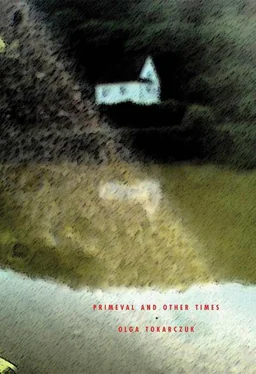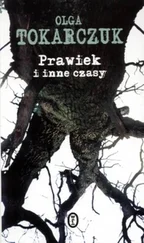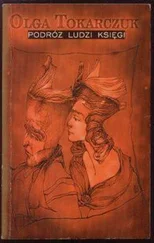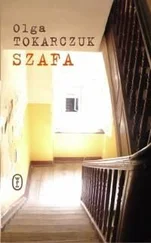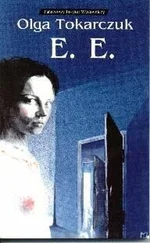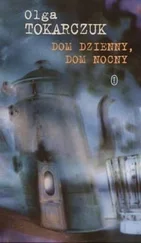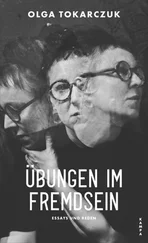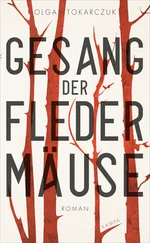People were scattered in all directions, and became enemies to each other. But the memory of what they had seen remained inside them. And he who has once seen the world’s borders will suffer his imprisonment most painfully of all.
Every Monday Stasia Papuga went off to the market in Taszów. On Mondays the buses were so packed that they went past the stop in the forest. So Stasia stood on the roadside verge and stopped cars. First Syrenkas and Warszawas, then big and small Fiats. She clambered awkwardly inside, and her chat with the driver always started the same way:
“Do you know Paweł Boski?”
Sometimes they did.
“He’s my brother. He’s an inspector.”
The driver would turn round and look at her suspiciously, so she’d repeat:
“I’m Paweł Boski’s sister.”
They couldn’t believe it.
In her old age Stasia had grown fat and had shrunk. Her nose, always prominent anyway, had got even bigger, and her eyes had lost their shine. Her feet were always swollen, and so she wore men’s sandals. Only two of her lovely teeth were left. Time had not been kind to Stasia Papuga, and it was not surprising the drivers refused to believe she was Inspector Boski’s sister.
One day, on just such a busy market Monday, she was knocked down by a car. She lost her hearing. A constant roaring in her head drowned out the sounds of the world. Sometimes voices appeared in the roaring, or snatches of music, but Stasia didn’t know where they were from – whether they were coming through to her from the outside, or flowing from inside her. She would listen to them intently as she darned socks and endlessly altered Misia’s hand-me-downs.
In the evenings she liked going to the Boskis’. Especially in summer there was something going on there. The vacationers lived upstairs. The children and grandchildren came. They would put up a table in the orchard under the apple trees and drink vodka. Paweł would get out his fiddle, and at once his children would fetch their instruments: Antek would get his accordion, Adelka – before she left – her violin, Witek his double bass, and Lila and Maja the guitar and flute. Paweł would give the signal with his bow and they would all start moving their fingers in rhythm, nodding and tapping out the beat with their feet. They always began with In the Trenches of Manchuria . She recognised the music from their faces. As they played In the Trenches of Manchuria , Michał Niebieski would briefly appear in the children’s features. “Can it be possible,” she wondered, “that the dead live on in the bodies of their grandchildren?” And would she, too, live on like that in the faces of Janek’s children?
Stasia missed her son, who after finishing school had stayed on in Silesia. He rarely came to visit, and had inherited his father’s trait of telling Stasia to wait and wait for him. In early summer she fixed up a room for him, but he never wanted to stay for long, not for the whole vacation like Paweł’s children. He always left after a few days and forgot to take the fruit syrup she had spent all year making for him. But he did take the money his mother earned selling vodka.
She would accompany him to the bus stop on the Kielce road. At the crossroads lay a stone. Stasia picked up the stone and asked:
“Put your hand here. I’ll have it as a memento of you.”
Janek looked around nervously, then allowed the imprint of his hand to remain under the stone at the crossroads for a year. Then, at Christmas and Easter, letters came from him that always started the same way: “At the start of my letter I can report that I am in good health, and I wish you the same.”
His wishes had no force. As he wrote he must have been thinking about something else. One winter Stasia suddenly fell ill, and before the ambulance had managed to force its way through the snowdrifts, she died.
Janek came with some delay, when the grave was being filled in and everyone had already gone their ways. He went to his mother’s house and spent a long time looking at the things. All those jars of fruit syrup, the calico curtains, crocheted bedspreads, and little boxes made out of the postcards he had sent his mother for holidays and namedays probably had no value for him. The furniture left by grandfather Boski was coarse and wouldn’t have matched any high-gloss units at all. The cups had chipped rims and broken handles. Snow was pushing its way inside the annex through cracks in the door. Janek locked up the house and went to give it to his uncle.
“I don’t want the house or anything that comes from Primeval,” he told Paweł.
As he went back down the Highway to the bus stop, he stopped at the stone, and after a moment’s hesitation did the same thing as every year. This time he pressed his hand deep into the chill, half-frozen ground and kept it there until his fingers went numb with cold.
THE TIME OF THINGS IN FOURS
From year to year Izydor became more and more aware that he would never leave Primeval. He remembered the border in the forest, that invisible wall. That border was for him. Perhaps Ruta knew how to cross it, but he hadn’t the strength or the urge.
The house had emptied. Only in summer did it come to life because of the holiday guests, and then Izydor didn’t leave his attic at all. He was afraid of strange people. Last winter Ukleja had often come to the Boskis’. He had grown old and even fatter. His face was grey and swollen, and his eyes were bloodshot from vodka. He would sit at the table, and then he looked like a mountain of spoiled meat, and in his croaky voice he would boast endlessly. Izydor hated him.
Ukleja must have sensed it, and being as generous as the devil himself, he gave Izydor a present – some photographs of Ruta. It was a premeditated present. Ukleja chose only those photographs where Ruta’s naked body, fragmented by weird lighting, was covered by mounds of his great bulk. Only in a few of them was a woman’s face visible – her mouth open, sweaty hair stuck to her cheeks.
Izydor looked at the photos in silence, then put them on the table and went upstairs.
“Why did you show him those pictures?” he heard Paweł ask.
Ukleja roared with laughter.
From that day Izydor had stopped going downstairs. Misia brought his food up to the attic and sat on the bed beside him. They would both be silent for a while, and then Misia would sigh and go back down to the kitchen.
He didn’t feel like getting up. It was good to lie and dream. And he kept dreaming of the same thing – enormous spaces filled with geometric shapes, opaque polyhedrons, transparent pyramids, and opalescent cylinders. They floated above a broad plain that could have been called the earth, if it weren’t for the fact that there was no sky above it. Instead there was a large, gaping black hole. Looking at it brought fear into the dream.
In the dream silence reigned. Even when the mighty solids came into contact with each other, there was no accompanying clash, not a whisper.
Izydor was not in the dream. There was only a sort of alien observer, a witness to the events of his life who lived inside Izydor, but wasn’t him.
After this sort of dream Izydor’s head ached and he had to keep fighting back the sobbing that came out of the blue and took up permanent residence in his throat.
One day Paweł came to see him. He said they would be playing in the garden and he should come down to join them. He looked about the attic appreciatively.
“You’ve got a nice place up here,” he mumbled.
Winter accompanied Izydor’s sorrow. Whenever he looked at the bare fields and the damp, grey sky, he was always reminded of the vision he had once seen because of Ivan Mukta, an image of the world without sense or meaning, without God. He blinked in terror, so eager was he to wipe this vision from his mind forever. But, nourished by sorrow, the image had a tendency to grow, seizing his body and soul. More and more often Izydor felt old, and his bones ached whenever the weather changed – the world was persecuting him in every possible way. Izydor didn’t know what to do with himself, or where to hide.
Читать дальше
